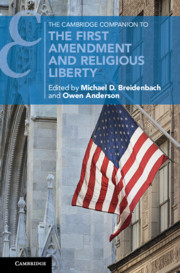Book contents
- The Cambridge Companion to the First Amendment and Religious Liberty
- Cambridge Companions to Law
- The Cambridge Companion to the First Amendment and Religious Liberty
- Copyright page
- Dedication
- Contents
- Notes on Contributors
- Acknowledgments
- Introduction
- Part I Philosophical Foundations
- Part II Historical Interpretations
- Part III Law, Politics, and Economics
- 9 Religious and Secular Presuppositions in First Amendment Interpretations
- 10 Two Concepts of Religious Liberty
- 11 The Economic Origins of Religious Liberty
- 12 Corporate Religious Liberty and the Culture Wars
- 13 Which Original Meaning of the Establishment Clause Is the Right One?
- 14 The Two Separations
- 15 The Challenge Ahead
- Index
14 - The Two Separations
from Part III - Law, Politics, and Economics
Published online by Cambridge University Press: 17 December 2019
- The Cambridge Companion to the First Amendment and Religious Liberty
- Cambridge Companions to Law
- The Cambridge Companion to the First Amendment and Religious Liberty
- Copyright page
- Dedication
- Contents
- Notes on Contributors
- Acknowledgments
- Introduction
- Part I Philosophical Foundations
- Part II Historical Interpretations
- Part III Law, Politics, and Economics
- 9 Religious and Secular Presuppositions in First Amendment Interpretations
- 10 Two Concepts of Religious Liberty
- 11 The Economic Origins of Religious Liberty
- 12 Corporate Religious Liberty and the Culture Wars
- 13 Which Original Meaning of the Establishment Clause Is the Right One?
- 14 The Two Separations
- 15 The Challenge Ahead
- Index
Summary
This chapter distinguishes and explores two historical justifications for the separation of church and state in America. The first separation is a specifically Christian piece of political theology, in large part for the benefit of a Christian civil society. The second separation is a specifically secular position for the benefit of a liberal society that wishes to divest from and repudiate Christianity. This chapter then describes the allure of equality and nondiscrimination as church-state ideals, their ascendancy in late twentieth-century constitutional law, and the sense in which they are believed to have supplanted the first version of separation. This chapter argues that neither equality nor nondiscrimination delivers a valueless perspective on the social and political worth of Christianity. The second separation holds that Christianity is an irrelevant, or even an obnoxious and illegitimate, influence in the making of laws or the structuring of the cultural and political realms. In a society in which Christianity has had such overwhelming predominance, insisting on equality is tantamount to squelching it and is nothing less than an expression of the second separation.
Keywords
- Type
- Chapter
- Information
- Publisher: Cambridge University PressPrint publication year: 2020
- 1
- Cited by

